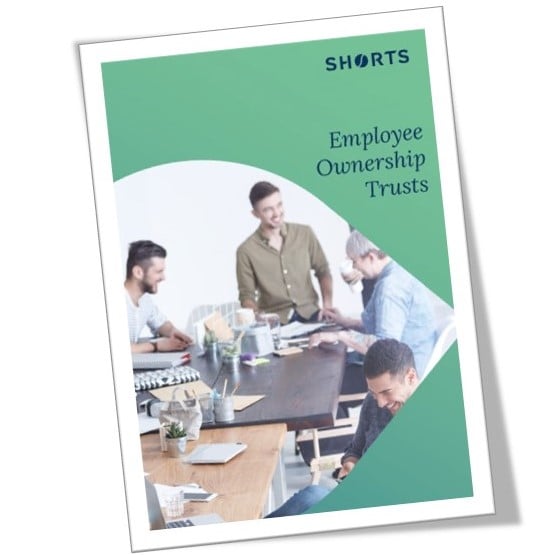.jpg)
An Employee Ownership Trust (EOT) is a type of trust that holds shares in a company on behalf of its employees. The company’s previous owners set up the trust and transfer their shares to it. The trust then holds the shares for the benefit of the employees, who can receive bonuses and other benefits from the company's profits. EOTs are a popular way for companies to transition to employee ownership.
But can a company’s shares that are owned by the EOT be sold to another company?
Can shares owned by an Employee Ownership Trust be sold?
Company shares owned by an Employee Ownership Trust (EOT) can be sold. However, it will not be as simple as a regular trade sale of a business. There are some important factors involved.
- Firstly, the EOT must have been initially set up in a way that enables the future sale of the company. This means that the trust deed must not include provisions that prevent the trustees from selling the shares, and the trustees must have the power to do so.
- Secondly, the sale must be in the best interests of the employees. This means that the trustees must consider not just the employees’ share of the proceeds of the sale, but also the impact of the sale on the employees' jobs, their pensions, and their overall well-being. They may decide they should consult with the employees as part of this decision-making process.
If these conditions are met, then the EOT-owned business can be sold. However, it is important to note that the sale of a company owned by an EOT is a very complex process, and there will be some major tax implications. It is therefore advisable to seek professional and legal advice before proceeding with any plans.
Why might an EOT’s shares be sold?
The Employee Ownership Trust model is highly beneficial for companies to which it is well suited, however, there are a few circumstances in which an EOT selling its shares may be a good option.
- If the company is struggling financially and the trustees believe that selling the shares is in the best interests of the employees because it improves the company’s trading position and consequently the employees’ job security.
- If a potential buyer has the potential through synergy or investment to grow the company in a way that is not otherwise possible, providing enhanced opportunities for the employees.
- If the EOT has received a very satisfactory offer for the shares, and the trustees believe that it is in the best interests of the employees to sell.
Capital Gains Tax when an EOT sells its shares
While the sale of a controlling stake in a company to an EOT carries a 0% Capital Gains Tax (“CGT”) charge for the exiting shareholders, this relief does not apply to the EOT if its shares are subsequently sold.
If the sale is within 1-2 years of when the EOT acquired the company then the sale to the EOT would no longer prevent the previous shareholders from incurring a CGT charge on that disposal. The sale agreement to an EOT usually provides the sellers with protection from this scenario.
If the EOT sells the company beyond the previous shareholders’ 1-2 years risk period then CGT will be applied to any gains from the disposal of shares by the EOT. Furthermore, the gain that is not taxed on the former shareholders on the sale of shares to an EOT - due to the 0% charge – is not written off. It is actually carried forward and will be taxable as part of the EOT’s gain if the EOT disposes of those shares later on.
The CGT payable by the EOT will be calculated on the gain from when the previous owners acquired the shares, not when they were sold to the EOT.
In short, this means the CGT liability when an EOT sells its shares can be very high, especially if the value of the shares has grown considerably since the previous owners’ acquisition of them. In practice, the tax could be 20% of the entire sale proceeds.
Deferred consideration owed to the previous owner
Deferred consideration is a portion of the purchase price of a business that is not paid upfront but is instead paid at a later date, often years down the line. This is a common payment method for an outgoing shareholder by an EOT because it can help to reduce the upfront cost of the purchase.
Naturally, if the initial sale of shares to the EOT involved deferred consideration, this can complicate matters if they have not yet been repaid in full. The previous sale agreement should require that in such circumstances the EOT must immediately pay any outstanding deferred consideration and may give the sellers a veto over such a sale until they have been paid in full.
Distribution of proceeds to employees
Once the EOT has received the proceeds, paid the transaction costs, calculated its own tax liability and settled any outstanding deferred consideration, it will have a balance of funds that it holds for the benefit of the employees.
This balance can be distributed to the employees, and the EOT must deduct Income Tax and National Insurance (including employer’s contributions) from the payments to employees. This could mean that around 49% of the proceeds for distribution to employees is payable in employment taxes, leaving 51% to be received by the employees.
Taking account of the CGT as well, this means that around 59% of the proceeds that the EOT receives for the sale of the shares could be payable in taxes.
Conclusion
It is generally possible for an EOT to sell its shares to another company, with the proceeds being applied for the benefit of the employees. However, EOTs are designed to be enduring ownership structures for the long-term benefit of all employees, with deliberate hurdles put in place regarding a future sale.
Any such sale is, therefore, unlikely to be straightforward and there may be a significant tax burden.

Adam Ames
During my career, I have gained an experience and an appreciation of the many issues and opportunities faced by businesses during all market conditions and economic cycles, which I use to provide invaluable advice to clients across all areas of corporate finance including EOTs, MBOs, acquisitions, disposals and finance raising assignments.
View my articlesTags: Corporate Finance, EOT
